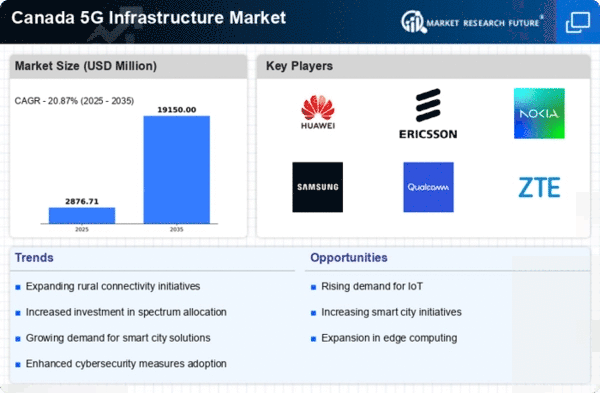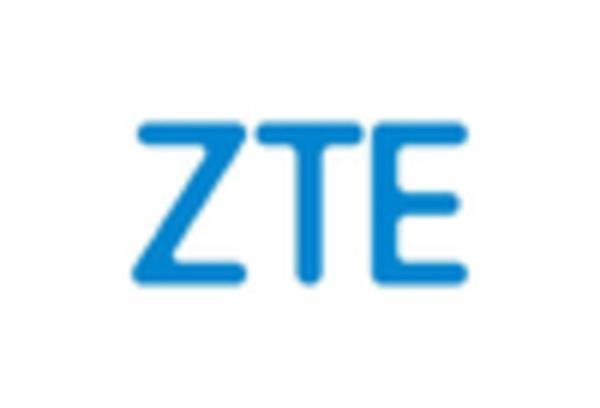Expansion of IoT Applications
The rapid expansion of Internet of Things (IoT) applications is a key driver of the 5g infrastructure market. In Canada, the adoption of IoT technologies across various sectors, including agriculture, smart cities, and transportation, is creating a pressing need for reliable and high-speed connectivity. The number of connected devices is expected to reach over 50 million by 2026, which will place significant demands on existing network infrastructure. 5g technology, with its ability to support a vast number of devices simultaneously, is well-positioned to meet these needs. This growing reliance on IoT applications is likely to propel investments in 5g infrastructure, as businesses seek to leverage the benefits of enhanced connectivity.
Emergence of Advanced Technologies
The emergence of advanced technologies such as artificial intelligence (AI) and machine learning is significantly impacting the 5g infrastructure market. These technologies require high-speed, low-latency connections to function effectively, which 5g networks are designed to provide. In Canada, industries such as healthcare, manufacturing, and transportation are increasingly adopting AI-driven solutions that rely on 5g connectivity. For example, the integration of AI in telemedicine is expected to enhance patient care through real-time data analysis, necessitating robust 5g infrastructure. As these technologies continue to evolve, the demand for 5g networks is likely to increase, further driving growth in the 5g infrastructure market.
Government Initiatives and Funding
Government initiatives aimed at enhancing digital infrastructure are playing a pivotal role in the growth of the 5g infrastructure market. The Canadian government has allocated substantial funding to support the deployment of 5g networks, recognizing their importance for economic development and competitiveness. For instance, recent budgets have earmarked over $1 billion for telecommunications infrastructure improvements, which includes 5g technology. These initiatives not only facilitate the expansion of 5g networks but also encourage private sector investment, creating a synergistic effect that propels the market forward. As a result, the 5g infrastructure market is likely to benefit from ongoing government support, which is essential for achieving widespread 5g adoption across the country.
Rising Demand for High-Speed Connectivity
The increasing reliance on digital services in Canada is driving the demand for high-speed connectivity, which is a crucial aspect of the 5G Infrastructure Market. As businesses and consumers seek faster internet speeds for applications such as streaming, online gaming, and remote work, the need for robust 5g networks becomes apparent. According to recent data, the demand for high-speed internet is projected to grow by 30% annually, necessitating significant investments in 5g infrastructure. This trend is further fueled by the proliferation of IoT devices, which require reliable and fast connections. Consequently, telecommunications companies are prioritizing the expansion of their 5g networks to meet this demand, indicating a strong growth trajectory for the 5g infrastructure market in Canada.
Competitive Landscape Among Telecom Providers
The competitive landscape among telecommunications providers in Canada is intensifying, which is driving advancements in the 5g infrastructure market. Major players are investing heavily in the development and deployment of 5g networks to gain a competitive edge. Recent reports indicate that telecom companies are expected to invest over $10 billion in 5g infrastructure over the next five years. This competition not only accelerates the rollout of 5g technology but also fosters innovation in network solutions and services. As providers strive to differentiate themselves, the 5g infrastructure market is likely to experience rapid growth, with enhanced offerings that cater to the evolving needs of consumers and businesses alike.
















